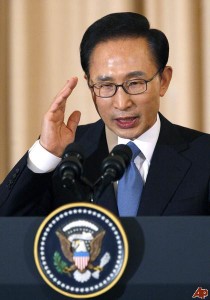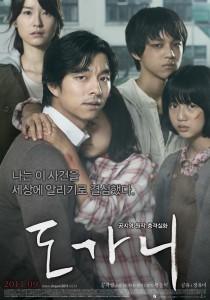Two years ago in 2009, a young girl in Korea was brutally and savagely raped by a drunk 57 year old man, Cho Doo-soon. The case was infamously known as “The Nayoung Case” the pseudonym a measure to protect the innocent child. The man, a repeat offender, got off with 12 years based on the fact that he was drunk at the time and the public, as a result, was outraged. Even the president Lee Myung-bak released a statement “I feel it appropriate that such grave felons should be separated from society for the rest of their lives.” And rightly so. The current South Korean laws regarding rape only allow a maximum of 15 years for the perpetrator regardless of the severity of the crime. The rape laws in South Korea are not perfect and it does not always properly administer justice to those who committed the crime. A great example of this case is the sexual assault case in Mujin’s School for the Deaf, a hearing impaired school in Gwangju. This infamous case was made into a book Dogani by Gon Ji-young and eventually a movie, The Crucible.
“I feel it appropriate that such grave felons should be separated from society for the rest of their lives.” And rightly so. The current South Korean laws regarding rape only allow a maximum of 15 years for the perpetrator regardless of the severity of the crime. The rape laws in South Korea are not perfect and it does not always properly administer justice to those who committed the crime. A great example of this case is the sexual assault case in Mujin’s School for the Deaf, a hearing impaired school in Gwangju. This infamous case was made into a book Dogani by Gon Ji-young and eventually a movie, The Crucible.
The administrators involved in the sexual abuse of the children were eventually brought to trial, but because of connections with the prosecutors and judges they were let off without much punishment. Even with evidence that supported the children’s claims, they were never brought to justice. Of the six who were indicted, only two served terms in jail, which was less than a year. Two other were given suspended sentences while the other two were let off due to the statute of limitations on sexual crimes. In another case involving the gang rape of a twelve year old, the four men involved were sentenced only to six years in prison, the judge citing that “Mr. B, unable to tell that A (the victim) was only 12, committed his acts because he did not think she was 12.” Not only that, but he later said that she had the ability to resist but didn’t–instead she accompanied these four men meekly into the hotel.
Recently, singer ALi, a rape victim herself, released a song “Nayoungee” in order to provide comfort and to inspire more preventative measures. Unfortunately, her song caused quite a stir and not of the good kind. Actress Kim Yeo-jin tweeted “Singer ALi, I hope you’ll change the title. This isn’t a song of comfort – it doesn’t even have the basic etiquette,” and netizens soon followed saying that the song was in poor taste because it brought up unwanted memories for the child. ALi and her company Trophy Entertainment quickly apologized and retracted the song from her album. It depends on the person, but I took the song to be a song comfort not just specifically to Nayoung, but to all rape victims who were unfairly scarred and had their lives changed forever. In fact here is the song and its lyrics:
The sound of the light and wind, falling from the sky
It rides the leaves and it rides the snowstormThe deep sounds of the ocean from the ends of the earth
It shines on the sun, it shines on the skyIt’s hard even to be alive and to breath
So she waits for the sun to set
She doesn’t try to run away anymore
She stands there and waits for the moon to riseThe gray light that seeps out of a young girl’s wet eyes
You threw away your youth, selling your body, selling your soul
Your pitiful life has been taken away from youIn this dizzy world, when you hope for a warm and brilliant love
Can you feel – can you feel it?
In the soiled heart, when you want a true and pure love
Can you do that – can you do that?Looking here and there but you still can’t believe in this world
Even if the world flows by so quickly, even if time leaves us
Trust your mind, trust your mind
The only reason why ALi should retract her song is if Nayoung or her parents told her that the song brought up painful memories and personally asked for it to be removed. But they didn’t. Neither the netizens nor that actress have any right to assume that it brought painful memories, if it really bothered the girl and her family they would have said so, but they didn’t. While I understand the netizens’ concerns, it is not as if the girl and her family is incapable of speaking for themselves. I feel as if ALi should have stuck to her guns and kept the song. Why? Because as a society we cannot shy away from sensitive topics like this, yes it was a dark moment in Korea’s history and its a poor reflection of their justice system, but it needs to be changed. I cannot emphasize how important it is to have open dialogue about sensitive topics like this.
 It was definitely hypocritical of the public to criticise her for bringing up a painful subject. I refer back to The Crucible, a movie that chronicled the sexual abuse happening in the Mujin’s School for the Deaf, and it would have brought up painful memories–but it was important for the public to know of the injustices that occurred. The citizens outraged by the lax sentences these administrators received called for a change and the laws did change. The Korean Government was quick to pass legislation that imposed harsher sentences on sexual abuse crimes. The Ministry of Education, Science, and Technology will be investigating over a million employees to check their history and determine if they committed any sex crimes. If convicted, they will also be subject to punishment and have their position terminated. Also, teachers convicted of such crimes will have their names published on the Internet and newspapers. The National Assembly (think Korean Senate) is working on abolishing the statute of limitations on sexual crimes against children, a serious roadblock to convicting these offenders. And the Grand National Party? They will ban teachers with a history of sex crimes from going back to work in schools.
It was definitely hypocritical of the public to criticise her for bringing up a painful subject. I refer back to The Crucible, a movie that chronicled the sexual abuse happening in the Mujin’s School for the Deaf, and it would have brought up painful memories–but it was important for the public to know of the injustices that occurred. The citizens outraged by the lax sentences these administrators received called for a change and the laws did change. The Korean Government was quick to pass legislation that imposed harsher sentences on sexual abuse crimes. The Ministry of Education, Science, and Technology will be investigating over a million employees to check their history and determine if they committed any sex crimes. If convicted, they will also be subject to punishment and have their position terminated. Also, teachers convicted of such crimes will have their names published on the Internet and newspapers. The National Assembly (think Korean Senate) is working on abolishing the statute of limitations on sexual crimes against children, a serious roadblock to convicting these offenders. And the Grand National Party? They will ban teachers with a history of sex crimes from going back to work in schools.
It is not as if the Korean citizens are incapable of causing change, but they need the motivation and awareness to do so. Accordingly, I commend singer ALi for discussing such a sensitive topic in her song because it brings an issue in society to light. According to the LA Times, the National Police Agency reported that the there has been over 150 sexual abuse victims under the age of 6 in the span of 3 years in South Korea. Of the 6,000 suspects detained for sexual abuse only 40% were prosecuted, of those convicted less than 1% received a life sentence, nearly half got off with fines, and 30% got suspended terms. You cannot deny the glaring injustices regarding this issue. Just because she is discussing an uncomfortable topic does not mean it should be hidden. We, as members of society and as human beings cannot allow injustice like this to occur. As Martin Luther King Jr once so eloquently put it, “Injustice anywhere is a threat to justice everywhere.”


